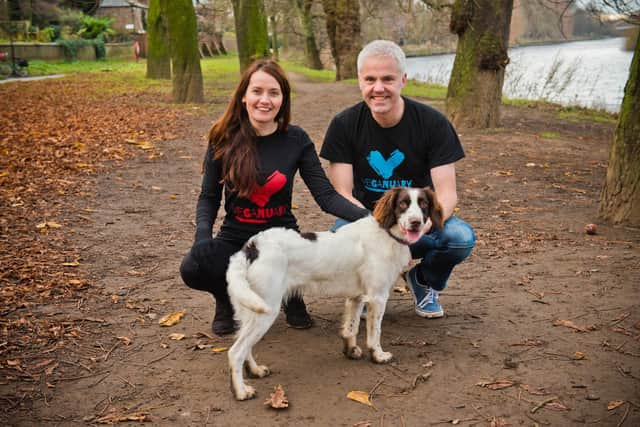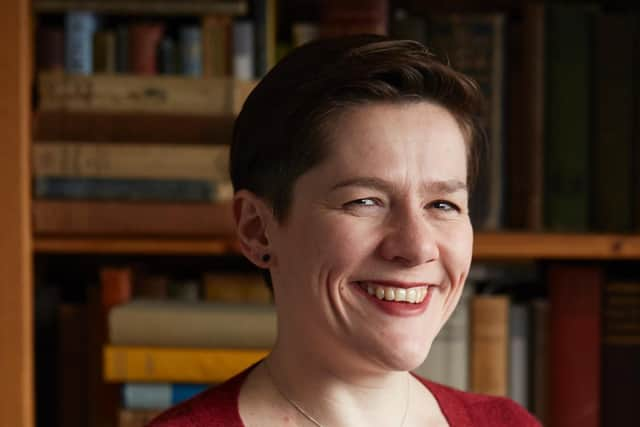COP26: We need dramatic climate change action, not 'greenwashing' say Veganuary founder
Research from the University of Oxford has long warned that dairy and meat production, while accounting for just 18 per cent of calories, amounts to 60 per cent of agriculture's greenhouse gas emissions.
Now, amid calls for plant-based foods to become the "default" for meals in settings such as schools, hospitals and prisons, there is a growing consensus for more to be done to radically shift perceptions.
Advertisement
Hide AdAdvertisement
Hide AdConversations should be centered around "diet change, not climate change", the York-based founders of the now vast Veganuary movement - which promotes veganism throughout each January - have said, with progress moving too slowly.


But as author Dr Annie Gray, a leading food historian, adds weight to concerns over meat-rich wealthy Western diets, she warns over a complex and "ideological" picture for global foodways.
"If we are going to eat meat we should value it for what it is," she said. "We should be regarding it as something we are privileged to have.
"We have to acknowledge though, from a middle class perspective, that while we might all wish we could live off farmers' markets, the world needs it," she added.
Advertisement
Hide AdAdvertisement
Hide Ad"If you're living on onion and vegetable stew, having a hunk of ham is a huge excitement. The idea of giving that up is unthinkable."


The debate over veganism and vegetarianism has proved increasingly topical, with Scarborough teenager Freya Cox now championing its benefits as the first vegan on the Great British Bake Off.
Veganuary, challenging people to follow a vegan lifestyle for the month of January, was first lauded in York by former English teacher and entrepreneur Jane Land and Matthew Glover.
This vision, now followed with annual product launches by most major supermarkets and restaurant chains nationwide, has grown beyond their ambitions, with impact on a global scale.
Advertisement
Hide AdAdvertisement
Hide AdIncreasingly, said Ms Land, people cite concerns about the environment when they join. And while there are drives to shop locally, the greater challenge lies in livestock than transportation.
Mr Glover's focus, he adds, has shifted from demand to supply, with the couple investing in food alternatives and for companies to scale up, and with calls for a radical re-think on funding futures.
"A lot of people are pushing for 'meat free Mondays'. The reality is, with such a significant challenge, it should be more like 'once a month'," said Mr Glover. "If we are going to take climate change seriously, it needs to be more dramatic than a bit of 'greenwashing'.”
"It's very emotive, is food," he added. "We've grown up eating meat and dairy, it's built into our society. It's almost easier to switch to an electric car than to go vegan.
Advertisement
Hide AdAdvertisement
Hide Ad"It's going to need the Government to lead on it. Sadly we are not shifting quickly enough."
Broader thinking is needed, he stressed, over land management for protecting futures rather than the past.
"We need the Government to get behind it and take it seriously,” he said. “We need to get farmers on board as well."
While the charity's trustees firmly believe solutions lay in a switch to a plant-based diet, with calls for it to form the "default" setting for most meals, Dr Gray is more moderate.
Advertisement
Hide AdAdvertisement
Hide AdKey solutions could be around food planning to reduce food waste, the University of York alumnus suggests, with a broad diet rich in nutrients, and making informed choices over meat consumption and purchasing.
"All the research comes to the conclusion that we need to eat less meat, especially in the West," she said. "Meat still has a prestige, being something that once only the wealthy could afford.
"Modern vegans can only commit through choice. We can only choose to give something up when we can afford to. We do need to eat less meat. Giving it up entirely is not the whole solution."
The vegetarian movement has always been present in the UK to some extent, she added, citing rationing in the post-war years and seasonal eating, which though "tedious" at times resulted in an incredibly healthy population.
Advertisement
Hide AdAdvertisement
Hide Ad"We now live in a very good era, it's far more exciting than at any point in the past," said Dr Gray. "There has to be more investment in meat substitutes which are acceptable.
"It always comes down to education, and not ideologising the past."